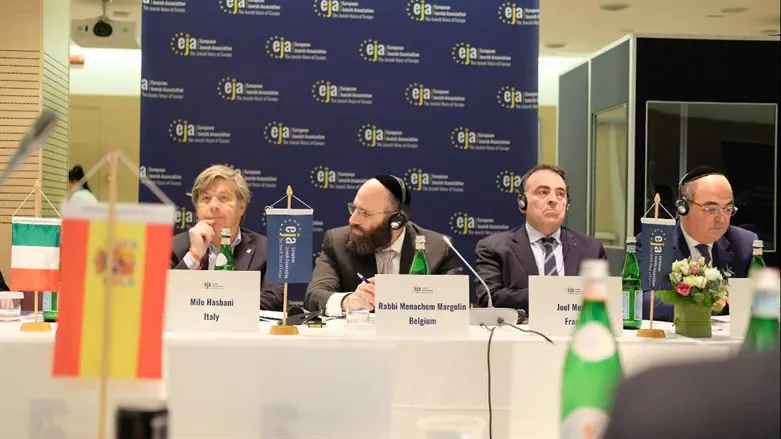
The European Jewish Association’s (EJA) Council of Jewish Leaders is meeting in Rome to discuss the challenges faced by European Jewish Communities.
Despite commitments to safeguard Jewish communities and promises to root out antisemitism, too many governments across Europe have done neither, concluded the 40 Jewish heads from across Europe present at the EJA’s Council of Jewish Leaders meeting.
According to them, there is a political and policing failure to act upon anti-hate and anti-BDS legislation already in place, and despite many countries adopting the IHRA definition, barely any are adhering to its principles.
“The laws and definition are not worth the paper they are printed on right now, said one Dutch Jewish community leader, citing the number of protests advocating genocide and ethnic cleaning of Jews in Israel, and often worldwide, by using Nazi tropes and iconography.
Based in Brussels and representing hundreds of Jewish communities across Europe, the European Jewish Association’s Council meeting is a key decision-making body of the EJA, bringing Jewish Leaders together to exchange insights and develop the strategic and advocacy backbone of EJA activities and policy for the betterment of Jewish life in Europe in 2024.
The Jewish leaders agreed upon an 18-point plan of action for 2024, including increasing community safety, securing a ban on the sale of Nazi memorabilia, and engaging major sports clubs and institutions in fighting antisemitism.
The Council was addressed by Israel’s Special Envoy for Combatting Antisemitism; Israel’s Ambassador to Italy; Alon Bar; Italy’s special envoy for combatting antisemitism Pasquale Angelosanto; and the President of the Italian Senate, Ignazio La Russa.
Joel Mergui, the President of the EJA’s Council of European Jewish Leaders and the Paris Consistoire, said at the close of the Conference: "The Jewish leaders are clear: We refuse to live in fear, we are strong and we will overcome this current tide of hate. It is unnacceptable that calls for genocide and ethnic cleansing as typified by, 'From the river to the sea,' and calls for, 'intifada,' are now commonplace, along with Nazi symbols and outright antisemitic imagery in regular use."
"This is a major cause of antisemitism, and authorities across the continent must do more to stick to their commitments that they have repeatedly given to protect Jews and fight antisemitism."
The Chairman of the European Jewish Association, Rabbi Menachem Margolin, said. "As Jewish leaders, it is our duty to protect our communities. The message from community leaders on the Council is clear: the EU and governments must translate their nice words on ensuring the safety of Jewish communities into meaningful actions."
“The test of any government commitments in standing up for European Jewry is right now. Our council is clear: Based on the evidence so far, European governments are failing this test.”
